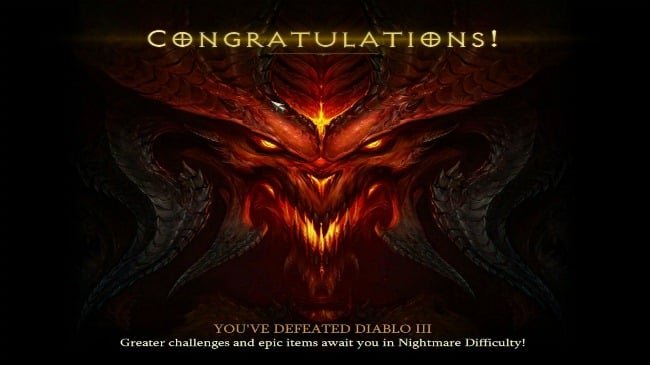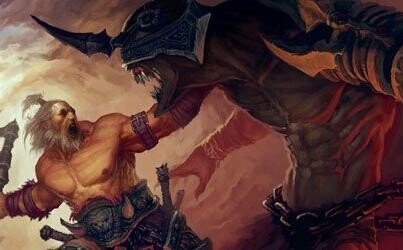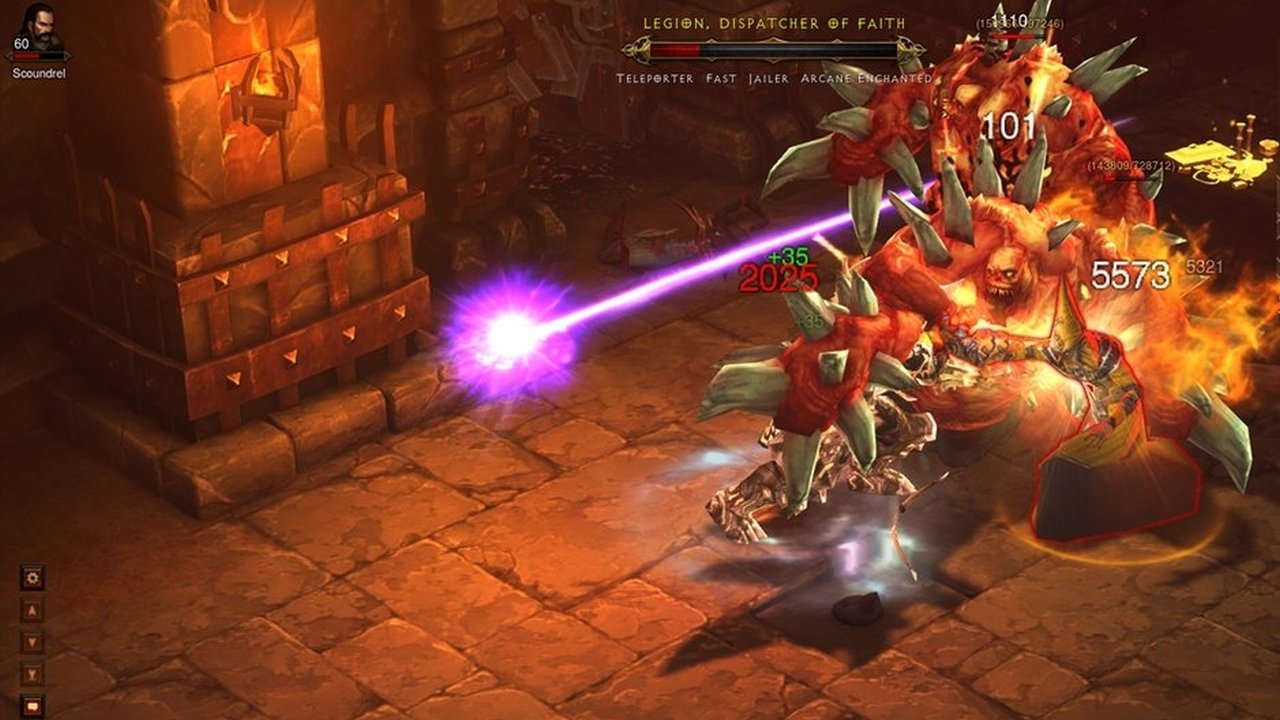Criticizing Diablo III is very much in vogue at the moment. Among the most common grievances: the story is abysmal, the classes are unbalanced, and the atmosphere is dull. But now that the game has been in players’ hands for a couple months, there’s a new and somewhat astonishing complaint: it’s getting boring.
 The Diablo series has always had a curious end-game for the outside observer. Repetition is the key: simply unlocking the highest difficulty requires multiple playthroughs. Once that’s been bested, a surprisingly large number of players linger on, continually replaying the same content for better and better equipment (and, presumably, fun). The game has always been played ad nauseam. This time, however, it appears people are reaching nausea a lot faster.
The Diablo series has always had a curious end-game for the outside observer. Repetition is the key: simply unlocking the highest difficulty requires multiple playthroughs. Once that’s been bested, a surprisingly large number of players linger on, continually replaying the same content for better and better equipment (and, presumably, fun). The game has always been played ad nauseam. This time, however, it appears people are reaching nausea a lot faster.
Responding to calls for action on the Blizzard forums, community manager Bashiok offered a surprisingly frank confession:
“We recognize that the item hunt is just not enough for a long-term sustainable end-game…There needs to be something else that keeps people engaged, and we know it’s not there right now…I think [balancing and PvP] patches will do a lot to give people things to do, and get them excited about playing, but they’re not going to be a real end-game solution, at least not what we would expect out of a proper end-game.”
This raises the obvious question: what makes Diablo III’s item hunt unsustainable, when Diablo II’s lasted a decade? Certainly the mechanics of play are much better; it’s more fun to brain a goatman than ever before. The lack of a ladder system or player vs. player combat is a genuine concern. However, the worst culprit is actually a new addition: the auction house.
Now, for some the auction house has been a tremendous boon. No Barbarian has to use a third-party site to trade for the legendary shield Baal refused to cough up. Players with even basic understanding of economic theory have made serious cash, often through simple arbitrage. Plenty of items, even substandard ones, have sold for the maximum $250 buyout. But with all the advantages the auction house brings, its inclusion has committed a cardinal sin by disrupting the Diablo cycle of effort and reward.
Diablo is often cited as an exercise in behavioural conditioning: every demon could hold a legendary, so you keep playing even if you’re no longer having fun. While that’s an unfair simplification—considering how prevalent such patterns are in other games and, indeed, in real life—it is nevertheless essential to the experience. Blizzard consciously uses these psychological motivators: for example, enemies are packed with useless (white) items to make the loot eruptions look more impressive.
The auction house, however, ruins the carefully tuned experience by adding several tedious steps between play and reward. The glut of available gear has made it much more efficient to buy equipment than to hunt for it. As a result, the flow is no longer “fight, get loot,” but “fight, get gold/loot, sell loot for more gold, buy loot.” The change is small but disastrous: play and reward have become disassociated. Picture the simple pleasure of cutting grass for rupees in Zelda. Now imagine that, instead of finding them hidden in the brush, you must shop around for someone to pay you for the task, and at the best price. Upon completion, you must wait three in-game days for your rupees to be mailed to you.
 To be fair, the play-reward rhythm works better in Diablo III than ever before—but only in isolation. Once exposed to the economy at large, the cycle seems designed to infuriate. You repeat the same content hour after hour, painfully aware that your rewards are actually shrinking rather than increasing; after all, the value of gold and most items continues to depreciate by the day. Even on the highest difficulty, much of the gear you collect is below your level or burdened with undesirable stats. Even if you find a good item that suits your class and play style, you probably could have gotten it earlier and easier through the auction house.
To be fair, the play-reward rhythm works better in Diablo III than ever before—but only in isolation. Once exposed to the economy at large, the cycle seems designed to infuriate. You repeat the same content hour after hour, painfully aware that your rewards are actually shrinking rather than increasing; after all, the value of gold and most items continues to depreciate by the day. Even on the highest difficulty, much of the gear you collect is below your level or burdened with undesirable stats. Even if you find a good item that suits your class and play style, you probably could have gotten it earlier and easier through the auction house.
There is, of course, the option to play “off the grid,” but it’s a harrowing choice (an unscientific poll of 3,000 players found that only three percent shun the auction house). You would need to accept that you will always progress slower than you could be, hinder your teammates, be crushed by Inferno difficulty and, when PvP is released, be at a competitive disadvantage. This is hardly ideal for an RPG in which progression means strengthening your character.
Yet an important question remains unanswered: why is this even a problem? Isn’t completing the game enough? Is an “eternal grind” even sustainable or desirable anymore?
Certainly Blizzard wants people to keep playing. While there is no monthly fee as with World of Warcraft, the company still earns some revenue from their auction house cut. An active community is equally important for bringing new players into the game and maintaining interest in expansion packs. Lastly, Blizzard has a reputation to uphold: Starcraft, Diablo II, Warcraft III and World of Warcraft define longevity in gaming terms.
But as for the gaming public, there is no pressing need for such a thing. People have more options for entertainment than ever before, especially PC gamers with a trove of forgotten purchases languishing in their Steam library. It’s unclear why they would want to spend so many hours replaying the same campaign.
At the same time, it’s equally unclear why people get tongue piercings or go skydiving or play golf. People will spend their time and money doing whatever they want, and no one has any authority to tell them what is valuable or not. The question isn’t whether these grinds should exist, but whether they will continue to captivate. Diablo III will be an important test.




